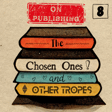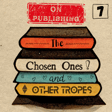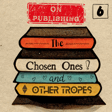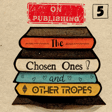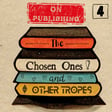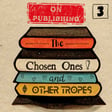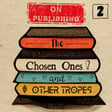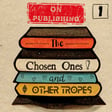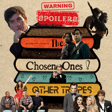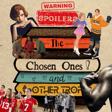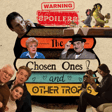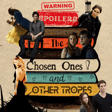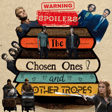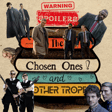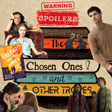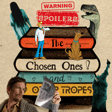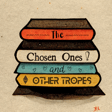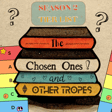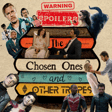Become a Creator today!Start creating today - Share your story with the world!
Start for free
00:00:00
00:00:01

S1.E10 - Trope Tier List 1
To wrap up our first season, we're kicking off our tier list. Tune in for an extra long episode of us arguing about which grade to assign to each of the tropes we've talked about on this, our first season.
- Naomi Gibson, author of Every Line of You, Game Over Girl
- Melissa Welliver, author of The Undying Tower, My Love Life and the Apocalypse
- Jamie Greenwood, creator & host of the Write and Wrong Podcast
Transcript
Introduction to Podcast and Tropes
00:00:00
Speaker
Welcome back to the chosen ones and other tropes where I ask two published authors about their favourite tropes and the ones that make them want to cry.
00:00:20
Speaker
Thanks to some people being. And it made you sad. That's what it made you sad. Man is so bleak. I was reading it and I was like, damn, this girl's gonna cut a hard life. You're gonna make a lot of enemies on the internet turning into a knife. No wait, I'll be like, stop recording. I'm sorry.
00:00:40
Speaker
Okay, I'll go through it one more time.
Structural Plan for Podcast Seasons
00:00:44
Speaker
So what we're planning to do with these tier lists is every 10 episodes, we are going to call that a season. And on every 10th episode, we're going to take all of the tropes that we had previously looked at and sort them into a tier list, a nice visual space for everyone to look at, which shows kind of where we feel these
00:01:03
Speaker
land on the spectrum of good or bad tropes. And as time goes by, as we do more seasons, we'll update the seed list, not only adding nine new tropes, but we will be sort of rearranging the other tropes as to
00:01:19
Speaker
You know, the kind of shifts are not just our own personal feelings, but let's say something like YA just became very popular at the Bologna Festival. So perhaps we're going to see some of the tropes we put quite high start to be overused and get saturated, in which case we'll want to shift them down. So it will evolve over time, which I think would be interesting and cool to kind of watch and observe.
00:01:43
Speaker
But let's explain the system we're going to do this in. It's going to be quite democratic. We're going to average whatever grade the three of us give things. So if I give an A, Melissa gives a B, and Naomi gives a C, we're going to call that a B grade.
00:01:59
Speaker
And I think it's probably important that we define how we're kind of defining each of these grades. So for me, it's going to be the way I was looking at it was a sort of system where
00:02:18
Speaker
If I give something a high grade, a good grade, that means that I'm saying as a writer and also sort of conversely as a reader, I'm saying this is a trope that I enjoy.
Grading Trope Popularity and Use
00:02:30
Speaker
It's a trope that I would like to see more of. I don't think there's too many pitfalls or sort of traps with it. Go ahead. I think you're in safe territory using this trope. If I give something a lower grade, say a C or a D, which is the lowest grades we're giving on this one,
00:02:46
Speaker
It means that I think perhaps this is a trope that as a writer, you should think, okay, do I need this trope? And is it going to work? Am I going to pull it off? There might be a lot more pitfalls involved. And for something like a D grade, we might be talking about you potentially problematic or just so overused that it's just cliche. So I mean, Melissa and I, is that kind of how you guys were approaching this as well?
00:03:14
Speaker
Yeah. Yeah. I think that's a good way. Thinking of it as writers and readers and for obviously anyone listening who's a writer or reader or both, hopefully. I think that works best. Yeah, for sure. Do I love reading it? Do I love writing it? Let's go with that.
00:03:28
Speaker
Yeah. Yeah. Yeah. Cause, uh, writers are for the most part readers. Um, okay then without any further ado, um, let's get off to episode one, which is a much broader, more of a sort of genre-y, uh, trope is episode one was unreliable narrators.
Discussion on Unreliable Narrators
00:03:51
Speaker
Let's start with, um, Melissa, where, where are you at in the tier list with unreliable narrators?
00:03:57
Speaker
Yeah, I forgot this was episode one, actually. So I'm trying to also think why thought then, and if I've changed my mind from listening, I'm like reading people's comments on Twitter and stuff. So I remember I wasn't like that first by unreliable narrators. I remember Naomi writes sort of unreliable narrators, and we chatted a lot about it. But it was something that if I'm completely honest, never think about when I'm picking up a book or watching a TV show, like I wouldn't be like, Oh, as an unreliable narrator. So I'm
00:04:24
Speaker
really keen to get into that. And I've also never attempted to write one. I know we sort of concluded that maybe all narrators are on the line. But if we're taking it sort of like gong girl levels of unreliable narrator, then I'd never like massively been drawn to it. However,
00:04:39
Speaker
Since we had a huge conversation about it, I do think it's something I would quite like to write, but I don't know if I've read enough to put it really high in my list, so I would just put it, this is very on the fence for the first one, very pathetic, but I would just shove it in B. Yeah. Classic. Classic. What about you Naomi?
00:05:00
Speaker
Um, personally, I love an unreliable narrator because they are always a little bit different. Um, everybody, so the unreliable narrators I particularly like writing have got trauma. Who doesn't love a bit of trauma? Um, and that, you know, that can be different, um, book to book, um, and manuscript to manuscript. So I love reading them because even though you know that it's coming and there's going to be a reveal, which is the trope, it's not always the same reveal.
00:05:27
Speaker
And it's fun to try and guess what it is along the way. So I love reading them and I do love writing them to try and, you know, drop in loads of red herrings for the reader and then try and guess what it will be. And then be like, oh, when the big reveal comes along. So I loved it as a writer as well.
00:05:44
Speaker
So yeah, this gets a good A from me, I think. It's not an S, but it's definitely an A. Okay. That's interesting. I also put this as an A. And my thing is that like, this is almost, it's like, I never, I don't think of this as like a,
00:06:03
Speaker
As some of the other tropes where I'm like, it's not like something you discover. I guess you can discover it as you're reading it, but it's for me, it's more of a kind of global decision that the author has made going in. And I think any trope, which is a conscious decision sort of almost before the thing is written.
00:06:22
Speaker
is usually going to be a stronger one. When I pick up a book and you're aware it's an unreliable narrator or the possibility that it could be an unreliable narrator, that's something that is just a choice that's been made and you're like, okay, this is the way it's being told. For me, it's almost like, okay, this is a first person point of view or a third person point of view. It's like, this is an unreliable narrator. You know what I mean?
00:06:51
Speaker
So for me it's more of like a style choice and I have no problem with it, which is why I was like, I put it in A. For me it's not S because like you said, if we take it to something like Gone Girl, if I were to read, like reading Gone Girl and mixing it up with other things, great. If I were to read Gone Girl and then go into something else, which was the same kind of thing with like a big twist and then another thing, like I couldn't read that back to back, I don't think.
00:07:19
Speaker
But that's obviously a personal preference. I bet some people live for this kind of thing. So I don't know. So two A's and a B. We'll round that up to an A. Yeah, for sure. First one done, off the list tick. That's such an easy one though. Yeah, that's an easy and inoffensive one. Let's go. Number two, much more spicy, love triangles.
Love Triangles: Drama or Predictability?
00:07:42
Speaker
Naomi, you can kick this one off.
00:07:44
Speaker
Okay, so I think when we talked about it last time, I'm trying to remember what I said and not be completely different to what I said. I think I didn't love them, but I didn't absolutely hate them either. And I think as a reader, excuse me,
00:08:04
Speaker
you're aware that at some point one of the love interest is going to get demonised in order to bolster the choice that the main character makes between the two love interests. And that kind of always annoys me as a reader, but as a writer, I would use it as a trope
00:08:23
Speaker
if I had a limited cast and I needed something else going on, like a bit of a B story. So I don't love it, but I don't hate it either. So it's a B from me.
00:08:36
Speaker
Okay. That's, I, in my memory, you were, you were much meaner about it. You really come around to it. I just, yeah, I think I was quite harsh about it actually, but, um, I still, it's not my favorite trope, but I think I would use it if I absolutely had to. So that's why it gets a B.
00:08:55
Speaker
I completely agree with you. I do think generally when I think about the mainstream use of this trope, there is more bad than good. The thing that really is frustrating is when someone gets yanked in a direction that their character didn't seem to be heading in. They're suddenly very evil or do something which is just wild.
00:09:19
Speaker
kind of reaching to a point and you're like, oh, that's unusual. And it kind of makes you feel like, well, why did I even bother rooting for anyone? You just feel a little bit miffed as a reader, don't you?
00:09:30
Speaker
Yeah, there was one I actually thought of, which I, where they tried, it was in a movie some years ago called This Means War, with Tom Hardy, Chris Pine and Reese Witherspoon. Well, the movie is, the whole thing is a movie, the pitch is a love triangle, right? These two best friends who both start dating Reese Witherspoon.
00:09:52
Speaker
And they literally battle each other for her affection and that ends with her choosing one. And then I think they tried to sort of do like, oh no, but it's a happy ending because I think she picks Chris Pine and then Tom Hardy not, but they're like, oh, it's a happy ending because he gets back with his ex or something. Ex-wife, yeah. And he has his family and it's like,
00:10:12
Speaker
That's so weird. First of all, was he ever even interested in Rees Witherspoon? Because he literally risked his friendship with his best friend for that. And then if that was true, then his ex-wife was the backup.
00:10:34
Speaker
Yeah, exactly. So she wasn't his first choice anyway. And it's like, bloody hell. But I mean, that's the other way of doing it. So they didn't demonise him, they just gave him like a solid B option. So that the viewer can be like, oh, okay, he's happy. It's okay. That's not good, though. No, but it's not good. Yeah.
00:10:53
Speaker
I still, I feel bad for his ex-wife. She was either, or Reese Witherspoon, but I guess she was part of the love triangle. So like she was, you know, part of the problem. But his ex-wife is like, you were either plan B or he was like so messed up that he, and he was kind of lashing out by dating someone else. It was weird. It was, it was an unusual, I didn't love it. Melissa, where are you in love triangles?
00:11:16
Speaker
Well, you guys are just twinning up against me on all of these tier lists, so I'm gonna come in and call some chaos. So, as a reader, like, can we have a quadruple S tier? I love it. I love it so much. Like, I think this is one of the episodes where I was simping about the Darkling and Madeline and Peter and the Shadow and Bone. Paul Ben Barnes, I'm sure he listens, and you can get my number anytime, Ben Barnes.
00:11:38
Speaker
And so I was like, oh, as a reader, like, I absolutely love it. And as a watcher, I absolutely love it, like on a TV show or a film or anything. However, as a writer, I do see and also as a writer, when you're reading something and you're dissecting it from a writing perspective, and you're like, Oh, is this like the most sensible route for the plot to go down? Or does this really make sense in terms of the plot and the character development?
00:12:01
Speaker
that it is, there are problems. So therefore I would put it in A because I love it and it's a toxic trait of mine. It is ridiculous. And at the end, I'm always disappointed with who they pick. Like I never failed to be disappointed. I just want it to carry on as a polyamorous relationship forever. Like I'm just happy for it to carry on forever.
00:12:16
Speaker
Um, but that's also part of why it can't obviously, it's not perfect. So I would actually put it in a, but that is of course, chaotic answer. Cause you know, you guys have to put it in B, which is wrong. Well, I haven't put it in B. I tell you where I've put it because I'm surprised. I'm surprised that, uh, I thought Naomi was going to be on the same page as me with this, but Naomi's done a bit of a turnaround. I can change it to C if you're like, I don't mind. No.
00:12:44
Speaker
Because I was really thinking hard about this and I was like, it can be fun. The biggest issue for me is that even before they spiral one of the characters out of control or kill one of the characters, for me it's always problematic if this exists. Whichever character is the one that people are chasing after the affection of, they're the person who probably should put a stop to this.
00:13:12
Speaker
And that for me kind of villainizes them and often like if they're the protagonist, like in Hunger Games or Twilight, that's when I'm like, you need to stop this. Like this is unhealthy for everyone and it's kind of weirdly self-serving and narcissistic of you to keep this going.
00:13:35
Speaker
Honestly, I was close to putting this in D, but I can't, because it's problematic guys. Yeah, I think B was maybe too generous though, I regret my answer.
00:13:52
Speaker
But I can think of times when I think it has worked and does work and because it does add drama and it is a realistic situation that happens. Like to teenagers, I think it's actually a very common thing that happens and teenagers often get sucked up into sort of these situations, which is why I think the movie that I talked about in the episode was Crush, which is a kind of classic high school thing. Yeah.
00:14:18
Speaker
where the main character is like obsessed with the super popular girl at school, but then she should try and get close to her. She ends up joining the sports team and then she ends up falling in love with the girl's sister. And then the reason that I really like that, and this happens in other, happens in quite a few rom-coms as well. It kind of happens in mean girls is when there's a love triangle, but one person, usually the person which is being deserted is totally oblivious to the love triangle.
00:14:48
Speaker
So it's like a competition between two people for a prize that they have no idea, like that doesn't even know they kind of exist or that it's going on. Because then I feel like you're not, and usually those resolve with one of the two, like sometimes they don't even end up with the person and it like, it resolves with one of the two people. They either get together or they kind of like have an amicable thing where they're like, I don't know why we were fighting over that person anyway. They're not even that great and they don't even know we exist.
00:15:17
Speaker
Yeah. So it doesn't villainize anyone. So I think that's why that's the only times when I think that it actually like really works for me. And I'm like, Hey, it was fun. I didn't mind it. And for this reason, I put it in C. Okay. I think
00:15:31
Speaker
After all our discussions, I have changed my mind and I think it is a C. It's not a B. It's not good enough to be a B. Sorry. I'm furious. I did it. I'm sorry. One of my goals was to be like, I can change someone's grade. Hanging up against me. I want, I'm going to quit. I'm going to rage quit this podcast. Do my own tea in it. Okay. Let's move on to the next one. Melissa can stop thinking about it.
00:15:58
Speaker
Number three, killing mentors. Melissa, because of the outcome of the last one, you can go first on this. You have a chance to debate both of our answers. Melissa goes first, okay.
Cliché of Killing Mentors: Overused?
00:16:12
Speaker
Yeah, I am not actually a fan as a reader
00:16:18
Speaker
or watcher or writer of killing mentors. And I think we talked a bit about this in the episode, but I do. It rarely makes me sad because I see it coming because it seems a very obvious plot point. But it's not the worst thing in the world because I understand why they put it as a plot point. And of course, the most important thing is to keep the main character moving forward. So I don't hate it.
00:16:39
Speaker
but I do find it a little bit lazy and I'm trying to think if I've written it in anywhere and I don't think so, I don't think I have. Like usually if I have a mentor, I suppose a bit spoilery, but if I have a mentor like I like to have them that maybe they're not really the mentor, I don't know if that technically counts as killing the mentor, if you have them like, oh actually the mentor's a bad guy, so they're not kind of connected with them anymore. So I do think you have to disconnect them. I do think an obvious way to do that is to kill the mentor so they're not involved with the character anymore.
00:17:09
Speaker
However, it doesn't really hit me in the feels, which it should because it's the death of a character and we have other death tropes that do hit me in the feels. So I would just put it in C. I think it's quite old-fashioned now. If I think of more modern stories that were written in the last 10 years, it doesn't happen as often. It still happens quite a lot. But I feel like it's not as common as it was and it just feels a bit old-fashioned. So I'll put it in C.
00:17:34
Speaker
Yeah, that's interesting. I think I agree with a lot of what you're saying. Yeah, that's right. I don't think it's, I don't think it's going anywhere. I know it's as a, uh, as like a mechanism for a story to, to like use, to utilize. I think it's just so it's, um, it's almost like a cheat code, right? To propel your protagonist forward, to jump forward.
00:18:01
Speaker
And whilst, yeah, it's a bit overdone, maybe, I do think it's just such a good way of doing that whilst also kind of giving a valuable lesson to the protagonist. Like it sets up not just like an ideal or like a self-confidence thing, but then it also sets up the emotion. It basically, it takes all the boxes you need for like his direction and motivation for your character. Yeah, it does.
00:18:33
Speaker
The things that I think are fun about it now, and maybe this actually degrades it, is that because it's so cliched, because it's so overused, the times that I'm kind of intrigued by it, or by not necessarily the trope as it is, but the use of the trope is because it has a sort of meta around it now, where as soon as
00:18:56
Speaker
Like you said, as soon as someone is identified, um, as a, as a kind of mentor figure, you're like, okay, well, you know, they're going to die at some point, which is why I think it's really interesting with something like hunger games where, um, Hey Mitch is, is like literally written. It's described. He is a mentor. It's like label this character.
00:19:21
Speaker
So playing with the sort of the wider kind of meta of storytelling, we probably all read that or watch that and we're like, okay, well, you've literally just like painted a target on his back. He's going to die. At what point will he die? And as you're kind of experiencing that story, you have this tension the whole way through being like, okay, maybe this is where he dies. Oh, he didn't die. And like you've actually now, by labeling him a mentor,
00:19:47
Speaker
you've kind of created a new level of tension and stakes just for this one character where it's like, oh, well, he's expected to die at any moment. You know what I mean? I kind of thought this with, I had this, I was thinking that this is sort of a weird take. I've had the debate with lots of people about whether or not you can actually spoil a good story. Like if a story is really well-written, there's a strong argument for it can't be spoiled.
00:20:15
Speaker
knowing what happens will change how you experience the story, but it will still be a good story to you. Like if you know the twist and the sixth sense, it's still an enjoyable movie to watch because you're kind of like, hmm, look at that. And that's so interesting. And like, I know this thing. So that's actually a really interesting scene for me to watch. You know what I mean? So I thought, you guys might not agree with him this. Oh, spoilers for Harry Potter.
00:20:43
Speaker
If you had never read or seen Harry Potter and before you started, someone told you, by the way, Dumbledore dies.
00:20:52
Speaker
I think it would add a certain je ne sais quoi to the experience because every book, every movie, you'd be kind of there being like, interesting. So this Dumbledore character, he's obviously not going to die in the first one, or maybe he will, because that's what a lot of mentors do. And then every time, every kind of episode that you went through, you would be like, Oh, I wonder if this is the one where he dies. And then every time he was in any kind of remote danger, you'd be like, Oh God, Oh God, you know,
00:21:21
Speaker
But you should know that already because they're a mentor. Do you see it coming? Yeah, I guess that's true. Yeah, I guess it is a bit played out. For me, you know what? I actually was going to put this in A's here because it just doesn't- Really? What?
00:21:37
Speaker
No. But you guys have changed my opinion. I'm moving this down to beta. Wow. Because I think it is. I also don't think it has to be so on the nose. Like it doesn't have to be the Obi-Wan kind of like very obvious.
00:21:53
Speaker
uh, mentor figure, it can be a more subtle figure. You know, if you talk about something like Joel is a mentor for Ellie in, in the last of us. So, you know, it can be a more subtle thing like that, or I dunno, you've, you've convinced me though, guys, I see the error in my ways. It's a B for me. Naomi, where are you putting it?
00:22:17
Speaker
I don't like this trope. I mean, it's not overly offensive, but I do think it's cliched and I do think it's lazy.
00:22:28
Speaker
between a C and a D for me, so I'll go C. Savage. Okay. Finally. Victory. What's next? Well, here's a fun one. I mean, this one seems pretty cut and dry for me. Episode four, Mary Sue and Gary Stu.
00:22:50
Speaker
Do you even need to discuss? Is there an eating? I'll just place it here for now. Just as a placeholder. I don't know what to say about this. For me, it doesn't feel like, what I've got here on my little notes is that it doesn't feel like a useful criticism. Because I think to say, oh, this story is bad. Let's do the one that everyone complains about on the internet. The new Star Wars films are bad because Rey is a Mary Sue.
00:23:20
Speaker
No, not really. That's not why they're bad. Like the fact that she's good at stuff is not why those stories don't work. There are great stories where the main character is good at everything. Just read the name of the wind. You know, it's a perfect example.
00:23:35
Speaker
of how you can make this trope work. It's not necessarily that they're good at loads of stuff or can pick things up very easy or everyone loves them. The issue is that they are one-dimensional characters and in the truest form of this trope that's made even worse because often what happens is
00:23:56
Speaker
the, the story or whatever it is, is written around this one character. So everything else, all the other characters, the setting, all the narrative that happens is created in service of this one, one dimensional character, which is fine because it's like silly goose fun fan fix stuff. And that's fine, but it shouldn't ever be popping up in Hollywood blockbusters or bestseller lists. And that's, yeah, that's true. What do you guys think?
00:24:23
Speaker
Agree. Agree. Anything else to add? Do we need to discuss this one any further?
00:24:28
Speaker
I don't think so. Like I think I just, it's just the problem is depending on what Mary Sue or Gary Sue and obviously Mary Sue we discussed in the episode, like comes from that Star Trek story and whatever you think it started off as, it definitely has become a placeholder for a boring character that does not have proper character development yet happens to be good at things. And therefore it is lazy and you shouldn't write it and you shouldn't like enjoy reading or watching it.
00:24:55
Speaker
I think we talked about the reason it's interesting in Twilight is because obviously Twilight was really popular as a very prolific Mary Sue character in Bella. But it also means that as a teenage girl reader, a lot of people talked about why it was popular. And you can quite easily step into the shoes of Bella because I think at one point somebody said she's barely even described how she looks. Yeah, Edward is described in minute detail how he looks.
00:25:18
Speaker
She's just like, yeah, she is really bland. And so you can kind of as a, as a reader step in and put your own personality on, which is an interesting way of using Mary Sue to make lots of money. I actually am not against making lots of money. That sounds great. But it doesn't mean it's not lazy. Nope. Deet it. Yeah. I agree. It's lazy. Um, don't like it.
00:25:39
Speaker
And boring as well. It is boring. It's boring as the voice. So boring, yeah. I'd say, and problematic in the, well, I'm just talking about Twilight here because it's like, you're saying, oh, you can put your, it's easy to put yourself in the shoes because she's basically just a canvas, like blank.
00:25:57
Speaker
But the, the, the real Mary Sue issue with, with Bella is that everyone falls in, everyone's in love with her. And she's like, she doesn't do anything. And she's not supposed to be super attractive or anything. Like she's not described as such as like, everyone just falls in love with her. And I'm like, well, that's, if, if you're giving this to like younger audiences and saying, Oh, you can just become this character. It's like, well, you're telling them that they don't have to do anything and people are just going to fall in love with them. Issues, issues guys.
00:26:26
Speaker
You know how Edward is interested in her because he can't read her mind? That's the whole point. If he could read her mind, I bet there would have been no romance. Maybe he could read her mind and he was so baffled at how there was nothing going on.
00:26:43
Speaker
Isn't that one of the lines in the movie? I don't know if it's in the book, but he's like, oh, I can read everyone's mind in this room, but when I look at you, nothing. I'm like, lol. He's like, oh, I just can't read your mind. And she's like, yeah, sure. Yeah, that's what it is. Yeah. Yeah. Okay. Easy one.
Orphan Trope: Lazy or Necessary?
00:27:00
Speaker
Uh, next up, uh, number five was orphans and or absentee parents. Um, Naomi, where are you at? So I, Alexa, shut up.
00:27:11
Speaker
How rude! I just got shushed by Alexa. Go ahead Naomi. So I love orphans. They are so fun to write. They are so fun to read. If you lean hard enough into it, they are awesome like Batman. I think if you're going to do this one, you've got to absolutely embrace it. So for me, it's an S. This is the only one I've given an S.
00:27:39
Speaker
I'm loving how different all my choices are to Britain. I'm surprised I added a new tier for this one. That's interesting. Um, Melissa, what about you?
00:27:53
Speaker
Mm. So I'm an only child. And so like quite often when I would read books with orphans in as a kid, this is psychopathic, by the way, like I don't think this is normal. I'd read it and I'd be like, wow, look, you know, I've got no siblings. And also if my parents died, like all of my favorite characters, I would be so cool and suddenly develop powers or might be rich suddenly or something. They'll be so awesome. I'd be all alone in the universe, just being against the world. So it was very dramatic. It was very dramatic in emo. It was very emo, my chemical romance.
00:28:22
Speaker
levels of just drama. So I really like it, but I do think it can be a bit lazy. For instance, I have tried to add siblings in books. I've just finished writing one, a draft that I've sent to the publisher for consideration.
00:28:37
Speaker
And I've given one character a sibling and I found it really difficult to remember what to do with them. And I know we're talking about orphans, but quite often orphans are also like, the reason that orphan is they're completely alone, right? Like that's part of the point is that they're completely on their own. So obviously you've got to get rid of parents, found that really difficult, did not kill any parents apart from one that's already dead before the story starts. But most of the parents are several parents that are alive and it was very difficult to get rid of them. It really was. And then also I tried to add a sibling and that was very difficult and I totally forget.
00:29:07
Speaker
forgetting she was there, so that's going to need editing. I know that's going to need editing because she definitely disappears at random points. So I quite like it. From a writing perspective, I don't think it's that important to, if you're writing YA, you just don't need the parents there. I do think it can be lazy, but I also accept I do it as well. And I don't mind that I do it because at the end of the day, I want to focus on the story and it doesn't upset me too much in terms of this is a shortcut to get to the story quicker.
00:29:33
Speaker
But I wouldn't put it in S tier. That was a bit road near me, but S tier. It belongs in S tier. It belongs in S tier. But I do, you know what? I was going to put it in B. But actually, because I don't mind it, and it never bothers me, when I read it, I never think like, oh, this is really annoying that there's an orphan here. I'm just like, yeah, that's absolutely fine. I'll put it in A. This is why it works though, as a trait on why it should be in S, right?
00:30:01
Speaker
Because as a reader, you want the main character to go off on their adventure. And as a writer, it enables you to do it. It just works, okay? It belongs in S, I'm telling you. Yeah. What's interesting is I actually think there are quite a, I'm trying to think off the top of my head, there are quite a few siblings.
00:30:20
Speaker
And I, now that you've mentioned siblings, I'm like, Oh, I, I'd not thought about that. But obviously this is orphans, absolute parents, because siblings is a separate thing. But, um, divergent has a, uh, she was a sibling and he becomes, he ends up becoming like a rival to her. Yeah, that's true. She has a twin. She added later in later drafts. She was originally an only interesting blog post about it, that it was just to explore the other faction. She added a twin. Yeah, that's quite a good, that's someone who likes world building.
00:30:50
Speaker
Guys, I spent all this time creating the world and you will see it. Yeah. And then obviously Katniss. Yes. Yes. Sibling. But she also has one alive parent, right? So she's not orphaned. Oh, that's true. That's true. Okay. Ignore me. Sibling is interesting though. Maybe there's a sibling trope that we need to look into.
00:31:14
Speaker
So when I was going over all the episodes and I was thinking about this kind of stuff, I, we didn't mention a couple of like, uh,
00:31:22
Speaker
big orphans. And I was like, Oh, we do. It's crazy that we didn't talk about this. Um, we didn't talk about Superman. Uh, and I was like, Oh, he's not even just an orphan. Like he's literally, but he's also like, yes, but he's also like the last Krypton or like when you first meet him and then I imagine in various different canons, there's, there's some, some stuff for genocide, essentially, which is like orphan of an entire people's world. This is what I'm saying.
00:31:51
Speaker
So I was like, oh, it's crazy we didn't talk about that. But again, I don't think there's much to talk about because he, whilst he's an orphan, he gets to extremely caring and loving adoptive parents. Yeah.
00:32:04
Speaker
So he probably doesn't count because he does have, uh, he does. Yeah. And then, um, 11, uh, was one that we didn't talk about, um, 11 story. I like, um, it's baked into her character, whether she's kind of abducted for science reasons. And then she does have a mother and she kind of tries to find her it's part of the story, but then you never really find her. Um,
00:32:31
Speaker
We didn't... I was doing a whole retrospective here, guys. We didn't mention the kind of tie-in with a lot of the orphan stuff, which is when you get orphan characters, that also often ties into another trope, which is found families. Yeah, I love that. And we've never discussed that.
00:32:47
Speaker
I do like found families, but sometimes, but I think it's, I think it's a slippery slope where it can sometimes feel forced and you're like, I don't know about this relationship, but that's definitely another episode found families. Um, uh, so where did I put this? So you guys have got an S and a not what I was expecting. Uh, this is, it's an interesting one. Uh, I have no problem with orphaned or abandoned protagonists.
00:33:14
Speaker
But you're like Harry Potter with the sorting hat on. It'd be great.
00:33:24
Speaker
For me, I think this is a B tier. Because I think this, and I'm looking at this from a more of a writing perspective here, is I think you have to do a bit more to make it work. Because I think you need to justify it, whether it's like through the setting in something like the Locke Lamora books, or baking it into the character design like Batman, or I don't know, maybe you don't, because then like with Frodo, it's just not mentioned.
00:33:56
Speaker
It's easy to explain, like, and you don't need necessarily a lot of backstory to explain it. And I think that's why it works so well, like from writing and from reading, because as a reader, do you, do you really care?
00:34:12
Speaker
Yeah, no, I see what you're saying. I don't love it, but I don't care that it's that. The thing about it is... No, I mean, do you care if they don't have any parents or not? Because as a reader, you want to read about someone who's going to go off and do things and you want them to go and do them really, really quickly. And so that is why you don't... You sort of buy into the fact that the people don't have parents because you're like, okay, so this is great because they're going to go off on their adventure. And I don't really care what happened to them.
00:34:36
Speaker
And all that maybe there's like a touching moment where they regret not having parents, whatever. But the main point is they're off on their adventure and I'm reading about this great adventure. And so that's why you don't really need a lot of backstory to explain it and why it's so easy to write because you're giving the reader what they want.
00:34:54
Speaker
It's true. My, my, my thing about it is, is more the, the element that it's, that I do feel like I do do see it a lot. And I do, there are times when if it's not done, um, sort of thoughtfully, I think it's easy to be like another orphan. And I dunno, I think, I think there's a lot of, um, I, you know, you read a lot of stories where there's really interesting interactions with parents and things like that. A lot of television. Um, you know, I watch a lot of,
00:35:25
Speaker
on, on, on whatever platform it is. And I think that there's, there's a lot of interesting stuff you can get from having parents involved because it's a dynamic that's so unique. Like there's no other, there's not really any other dynamic that's like that. So for me, it's going to stay and be controversial with this group, apparently. Which means ends up in A and I'm correct. Yay. And Melissa wins this round.
00:35:54
Speaker
I think that's a great showing for orphans though, being next to unreliable narrators, which I think unreliable narrators is such a staple. Yeah. Yeah. They're both storytelling techniques as well, which is quite interesting. Okay. All right, fine. I'll take it. Okay. Um, number six, uh, and it's, this is, this is one of Naomi's once, uh,
Forced Motherhood Trope: Problematic?
00:36:19
Speaker
force motherhood.
00:36:19
Speaker
This is an F for me. I'll just put it straight up here. It was just jumping straight in. It's so problematic. Yeah. Authors using characters as mouthpieces for their own views, often just shoving stuff in because you want that HEA at the end of the book. Yeah. Women can't be complete unless they have children and or a husband. And it's like, I just, no, it's not for me.
00:36:49
Speaker
Yeah. Yeah. And I mean, it's similarly to love triangles, but not in the same, but much worse is it does. This one so much of the time comes with that last minute swerve into like, and then after mastering the universe and liberating the free peoples of the world, she got married, settled down and had babies. It's just no, it's not good.
00:37:13
Speaker
Yeah. I mean, motherhood is absolutely fine as a resolution. If it's been set up, if it like makes sense for the character, if it's, you know, if it has, I don't wanna say foreshadowing, but like, it just has to make sense for the character. When it's the last second, like, and then Katniss decided to have children and not name them. And just a boy and a girl. Yeah, if it's in a romance type genre,
00:37:41
Speaker
category whatever it is yeah um it works and it's fine because it's probably built into the characters anyway but yeah when it comes it's like a total affront to everything else that has happened it's like no.
00:37:53
Speaker
It's an F. Yeah. I mean, and the trope is forced. That's the thing is like, that doesn't even count because I was, when I looked at this, I was like, yeah, but that's just motherhood, which is not a trope. That's just like, you know, it's a normal thing that a lot of people want. It's forced motherhood is the trope and it's just always bad. It's always bad. It's always problematic. It's old fashioned. Melissa, anything to add?
00:38:15
Speaker
Is there anything to add? Not really. Yeah, it's always annoying, especially at the end of like a middle grade or young adult series where they just go, oh, you're not ready to leave yet. We're going to fast forward 19 years just so we can show that they had children so that their children can take over the next series if I feel like writing this later.
00:38:35
Speaker
And that feels lazy. It happens in Holdark as well, actually. It's just annoying. It's annoying. And it's just like, oh, if we get renewed, maybe we'll pop back with these kids, eh? I know kids can watch it. I don't know. And it just feels lazy. I don't like it. I don't like it. Yeah. Although nowadays they just love to like, they wait like 20 years if it's the actors are young and then they'll, they'll.
00:38:55
Speaker
bring back a whole new thing where it's like, Oh, we got all the actors back. Like look at Jurassic world. It's all the old actors guys. I'm like, yeah, great. Great story. Good job. I mean, I'm waiting for, I think maybe 10 years time.
00:39:13
Speaker
I won't be surprised if there's a whole set of movies announced for Harry Potter and they bring back the main three actors and they're all just playing their older adult selves. I wouldn't be surprised at all. But we'll have no character development because it's not like we actually wrote in what happened in those 19 years. They're just there. Well, that's the Cursed Child.
00:39:37
Speaker
They're just gonna they're gonna do that, right? It's there's no way that's not being made into a film in life I don't know how that's supposed to be but probably like 10 20 years. Yeah That will be interesting to see what happens there because I think a lot of the actors who
00:39:51
Speaker
from the original cast disagree with a lot of JK's views, so would they do it? I don't know. Well, you're assuming they haven't already signed that contract. When they were like 11, yeah. It's probably like the small print in their contract was like any future things we wrote.
00:40:12
Speaker
Anything I write children into, you must play the dad of our child. See you in 20 years. That series will all be about their children and setting up their children for their new, like, young adult series. Exactly. Yeah. It annoys me. Okay. Well, this one sucks. We don't need to, we all did D, right? We don't need D. Yeah. Okay. Next, next, next, next. Episode eight. This was a, wait, have I missed one?
00:40:42
Speaker
I've missed one. Episode seven, prophecies and chosen ones.
Chosen Ones and Prophecies: Intriguing or Lazy?
00:40:48
Speaker
Melissa, you go, you go, you go, you go.
00:40:51
Speaker
This was quite hard actually I think because again in a similar way to orphans I don't really mind if it's like propelling the story along because it feeds into the whole hero's journey Which you do need like I think we were talking about this with the last of us that they is it naughty dog like to say they like to do simple stories but with complex characters and this is a way to do a simple story that you recognize and and we talked about the episode like a Lego movie and they flip it on his head and all this kind of stuff and
00:41:18
Speaker
So I don't mind it a bit like with orphans. However, I do sometimes find it annoying depending on how well they set up the prophecy or if it's quite obviously like set up later in the series and they clearly hadn't thought about it to start with. So I think I'm going to, do I sit on the fence and put it B or put it in C? So I do find it a little bit annoying.
00:41:40
Speaker
I'm going to put it in C. I'm not going to sit on the fence. I'm going to put it in C. Yeah, I'm going to put it in C. I'm looking at what else we've got in C as well. And I feel like it's on like a similar vibe of can be lazy, but I don't mind it. So I'm going to put it in C.
00:41:55
Speaker
Yeah. I, I, I kind of agree. I, this one, yeah, this one probably set the most thought though for me. Yeah. Cause I was like, that was a part of me. I think the thing is we made it harder as well by doing it as one episode because prophecies and chosen, I think chosen ones almost always exist within a prophecy to some degree.
00:42:17
Speaker
But there are prophecies that don't involve chosen ones. And when I, when I thought about it like that, there was a part of me that was like, God, that's super lame. Isn't it? Like, I mean, you mentioned Ellie from the last of us and like that actually was something I hadn't thought about when we were talking about the episode. And that kind of changed my perspective a bit. And I was like, Oh, you know what? That is actually an interesting way of doing like you chosen one doesn't necessarily have to be like,
00:42:44
Speaker
an ancient mentor with a beard says, oh, you are the chosen one, destined to whatever. Like you can be chosen by so many different factors. Like Katniss is chosen by society, the sort of the rebellion around her, right? And then Ellie is chosen by genetic natural selection. And that's an interesting way of doing chosen ones. I think there's a lot of
00:43:07
Speaker
I guess it depends how you define a chosen one, but once you tie it in with the prophecy, then it's like, okay, so now we're talking like Aragorn, like Anakin Skywalker. And for me, I was like, you know what? The Lego movie did it best. Cause when the Lego movie was just like, it's an excellent movie. It's an amazing movie and you should all go and watch it.
00:43:31
Speaker
Just when they were like, oh yeah, oh, there's always a prophecy. And I'm like, yeah, that is always a prophecy. And it's just a cheat, like, it's a cheat code. It's like, get out of jail free, Scott, easy kind of thing. So I think, yeah, prophecies, I'm sure you can make it work. And then there's like the Harry Potter thing where it's like, oh, the prophecy and it's, it's, you don't know who it is. Maybe it's Neville. And I'm like, it's not Neville.
00:43:54
Speaker
It's not. Her name's not on the cover. It was so confusing. Yeah, I don't know. For me, it was also, you said C, right? It was C for me as well. What did you think Naomi? We've got it down as the chosen one of prophecies, right? I would rank the chosen one higher than a prophecy, if that makes any sense. I think basically what you were just saying.
00:44:22
Speaker
As a reader, I don't mind it because like, I think we discussed it in the episode where we was talking about it being basically a promise. And so you see it on the page and you know what you're going to get. And you know, the fact that there's a prophecy, this chosen one is going to go off and try and prevent the prophecy. And it's so doing.
00:44:39
Speaker
make the prophecy come about. And I think you see these things and it's a recipe and you know where you're going to get and you're along the ride really. But I think it's down to the writing to make it differently. Sorry, it's different to others that use the same trope and how successful it is. So, yeah, I don't know. I had it down as a B
00:45:03
Speaker
You know what changed to be because I nearly went B now that I'm like, yeah, C plus high C. Yeah. I'm thinking, yeah, because I can never be. I'm thinking because if you can look at chosen ones as something like, it doesn't have to be like a mystical ancient. Yeah, that's it. I think that's how I would differentiate it. The prophecy can also be that I liked that what you said before, like, um,
00:45:31
Speaker
simple storyline, complex character and I think that definitely...
00:45:35
Speaker
Um, yeah, I can live with beat. I nearly went B. I just felt like it was, I wanted to be more controversial. Hey, I'm glad to have one. Okay. I like that one. Yeah. I feel like that one, you can keep thinking about it in different ways. There's a lot of layers to that. Yeah. When I think of a prophecy could just be something, some, you know, one of the classic, um, tricks that a lot of authors do, and you'll see this in lots of movies and stuff is that, uh,
00:46:04
Speaker
the, there'll be a character early on that identifies exactly the, the like issue with the main character. Yeah. But it'll be just like a throwaway thing that they're like, yeah, whatever. And then later on, they'll come to like, they won't like think back to that specific moment necessarily. But what that does is it primes you as the reader, as the audience to be like, Oh, that's the thing that's wrong with them in the back of your mind. But, but then it kind of comes back around. And I guess that is a prophecy in of itself. Yeah. So yeah, it's an interesting one to think about. Um,
00:46:34
Speaker
or not, seeing as we put it right in the middle. Okay.
Strong Female Representation: One-Dimensional?
00:46:42
Speaker
Uh, episode eight, which was, um, brought to us by the wonderful Cassia Lupo, uh, badass, super strong female characters. Uh, Naomi, what do you think? So I think I was on the fence with this one because it is very problematic, but I.
00:47:05
Speaker
came at it from a point of view of younger readers, particularly younger girl readers, seeing badass females on the page. And so yeah, it's so problematic because it means that you can't have a three-dimensional female character really. But at the same time, seeing a girl go kick butt is pretty cool. So I gave this one a C.
00:47:30
Speaker
Okay. That, yeah, that makes, that makes sense. Um, this one and it's, yeah. The, well, I mean, the trope is like, we know what the trope is that we, and we discussed it at length in the episode. It's that, you know, the characters who you genuinely think are like really strong.
00:47:52
Speaker
independent female characters are not generally, like the ones that come to mind are not the ones in, you watch in a movie where it's like, oh yeah, they're just like really good at fighting and like shooting stuff. And, um, which the, basically Michelle Rodriguez's.
00:48:12
Speaker
But as I was finding the picture, because I thought it would be funny to just have her all over the picture for the episode. I thought that was funny. As I was looking through the pictures and I was remembering her in some of the movies, I was like, there's a reason that she is the chosen one for Hollywood to be this role. It's because she's convincing. Yeah, she is. She's broody and she does it well.
00:48:35
Speaker
Yeah, but she also, she also, I think keeps, um, she keeps her sort of femininity while she does it. Like you never watch her and you're like, Oh, it's a woman trying to be a man. You're like, Oh, it's, you know, she's, she's always a woman. She just has traits. She, she pulls it off. And I think hats off to her for, for
00:48:54
Speaker
fulfilling this role, which I think actually a lot of other characters wouldn't. The one that really conversely I thought of, and it's not a woman, but it's, um, I can't remember what the movie was called, something in the, something in a thousand stars. It was with, um, Cara Delevingne and Danes Dahan. And he, and they like something a thousand cities. Oh, yeah. Yeah. Oh, that was bad.
00:49:20
Speaker
very bad, but like the casting, I was like, this is terrible casting. I think Danes De Han is a really good actor. I thought he was so good in that superhero movie where they kind of found powers and it was all filmed on like handheld cameras.
00:49:37
Speaker
Oh yeah, super eight. No, not that one. It was way before that. That's a very similar plot. It was, I can't remember what it was called. It was, they were all teenagers. They were like in high school and it was Michael B. Jordan. It was like one of Michael B. Jordan's class movies.
00:49:53
Speaker
Um, they, he, I think he's a really good actor, but I, that was based, I believe on a graphic novel or something. And the, that character that he was supposed to be playing was a sort of Harrison Ford, like, um, swashbuckling rogue type character, like.
00:50:11
Speaker
handsome and muscular. And everyone in the story kept telling you, it's like, oh, he's so handsome and dashing. And I'm like, that's not really Dane's energy. You know, this is the guy who's playing the Green Goblin. He's a much more intense kind of slim character. And it just felt like such weird casting. And that kind of feels like, I think, how they portrayed the strong female characters in Lord of the Things where they're like, oh, we'll just pick
00:50:40
Speaker
And it's mostly movies, but it's like, oh, we'll just pick, you know, this, uh, this currently popular actor and, and the, they can't pull it off. They're just miscast in that role because the, because the role doesn't have any dimensions. That was such a long tangent for like
00:50:58
Speaker
I think it's, I think it's decent because you can have, you know, it's strong female characters exist all over the place. You don't need to give them guns and they don't need to kick ass to do it. They can. Like I think we talked about 11 in the episode. I think 11 is a great example because she's super powerful and like, no one can really fight her one-on-one, but at the same time, she's like complex. She has her own issues and things like that. She's vulnerable.
00:51:24
Speaker
or Ripley from Alien, largely because Ripley was written without any, it was just written as a character. It was undecided, I believe, whether it was a man or a woman when they wrote it. So it was just like, this is a character. So all the decisions that Ripley makes are character decisions, not biased towards like, oh, well, what would a man do in this situation? What would a woman do in this situation?
00:51:48
Speaker
I think the only thing that would stop me putting it in D is because you can have badass male characters that are just like, I'm thinking like series like Jason Bourne type characters that are just allowed to be badass. I don't have to be 3D or James Bond, for instance. And they're just allowed. So I'm like, women are allowed them too. I've decided so I put it in C. That's a good argument.
00:52:11
Speaker
Well, that's um, they'd have to be all the time. James Bond is more three-dimensional than that, don't you think? James Bond. Yeah. Oh, he is now. He is now. Well, yeah, now he is. Up until Daniel Radcliffe. Daniel Radcliffe will be amazing. Oh my God, petition Daniel Radcliffe for the next Bond. Daniel Radcliffe going from playing weird Al Yankovic to James Bond. Yeah.
00:52:35
Speaker
Nice. Up until Daniel Craig, he had no backstory. No, he didn't. He was a bit useless. And his wife died in one of the movies, right? Yeah. But he was just like, I always get the girl. I'm so mysterious. I always order the same cocktail. What is wrong with you? Just order something else. Like be experimental. Yeah. So I think we're allowed those two. Ladies can have these silly action heroes. Why not?
00:53:00
Speaker
That's so true, that's a good point. I don't love them, see. Caveat, as long as it's not there as like a token edition. As long as it's not like, oh, you wrote the cast and then it was like, oh, um, I don't feel like we have enough badass female representation here. Let's just chuck this woman in with the sword.
00:53:19
Speaker
Yeah. Yeah. That can be useless, but yeah. Okay. Um, I think that's fair. And the, the, the final one, the last one of our season one is, uh, the trope that none of us realized was a trope until someone, until Melissa like looked it up and was like, Hey, that is a trope. Help us window deaths.
Emotional Impact of Helpless Window Deaths
00:53:42
Speaker
Um, I'll, I'll, I'll start off with this one. I love it. Can't get enough. Um,
00:53:48
Speaker
I'm at a point where I'm happy to see more of this. There's enough variation from it being bittersweet to horrifying and infuriating. Whilst it's not uncommon, when we were going through the episode, we all thought of a bunch of different
00:54:06
Speaker
Scenes and sequences where this happened or like quite edge cases where this happened I've never seen this and been like oh this trope again You know it doesn't it doesn't trigger anything inside of me that takes me out of the experience if anything some of my favorite scenes in loads of different like movies and stuff are this
00:54:25
Speaker
exact thing. Like it's very memorable. Um, and I would be happy to see more of it. And I think what we were talking about, we were like, damn, I got to write one of these. This is great. This is great stuff. It's so good. And you know, it's coming as well. I love that bit where you're like, wait a minute. This isn't a window death. Is it? Oh, wait, it's a window. Let's go. Like the window comes down. You're like, yes, it's happening. I'm already crying. Um, so for me, for me, it's Esther.
00:54:54
Speaker
No, as to really. Because I just, the other thing about it is I don't think it's hard to do it sort of badly or in like a dumb way. Like it's, even if you did it and it didn't have that much meaning, if it was like not that big a character, like we talked about in the Watchmen, there's like a kind of minor one, which happens very early on. And I'm like, it's never bad. Like even when it's like meh, it's like, okay, it's just a thing that you don't even think about it. You don't engage with it.
00:55:22
Speaker
Yeah. Okay. So we're saying I went into this episode really uncertain, actually. And I think I came out of it really loving it. They are really fun to watch, actually. So emotional, so dramatic. And I want to write one. So, but it's not an SDF for me, I think, because I think an SDF for me has a book has to revolve around something, and it has to really lean into it and really own it.
00:55:48
Speaker
which is why Orphan should be up there. So the Help This Window Death gets a solid A from me because it's just a little thing that happens. It's not an entire block. Yeah. Yeah. It's a chapter trope as opposed to a book trope. Yeah. What about you, Melissa?
00:56:07
Speaker
This was my only S tier. I love it. I absolutely love this one. Like I said, even when you know it's coming, whether you're reading or watching, it starts to trip up on you and it's one of those things where you slowly realize, oh, they can't get out. Oh God, we're going to have to watch them. And then I'm excited to cry. And I call the tissue box first and I'm like, yes, I'm going to be such a mess after this. I love it. And I never get bored of it and I've never seen a bad one.
00:56:31
Speaker
And it's always interesting in some way or another, especially because you just get to see what's happening. And especially in a book where there's loads of times, especially in a first person perspective, but we don't get to see what's happened. It's a really good way to show what happened, but still feel helpless because you can't do anything. Love it.
00:56:46
Speaker
And it's got, it's got such a range too. Yeah. You know, like the, the, the Hunger Games one we talked about, and then you've got like, obviously the Kirk and Spock one. Um, and then I was thinking about, that was an interesting, um, you know, independence day. Yeah. There's a bit when they have the alien in the lab and it like, uh, mind controls the doctor and you're like, you know, he's dead. Like my first favorite film of all time. No wonder. And now I know.
00:57:13
Speaker
Um, but that's, that's an interesting one because that's different from the other ones where that's, that's like a sort of horror, like, Oh my God, this is like borderline scary and kind of like, uh, you know, exterminate them kind of thing. So what a range. I'm also really glad that we got one in each. That was the main thing. I was like, yes, please, please. Well, that's it. What do you guys think?
Season Conclusion and Listener Engagement
00:57:38
Speaker
I know Naomi's upset about Orphans being A. I've been bullied consistently on this show. I will be putting in complaint. At least we're all unanimously in agreement about Dieter.
00:57:59
Speaker
It was just so easy. Yeah. Straight in there. Straight in there. Some great discussions, the prophecies and chosen ones. Maybe we'll revisit those in as separate entities in a later episode. Yeah. I think there's a lot, there's a lot more to unpack with those. Yeah.
00:58:16
Speaker
Anyway, that's it season one tier list for the chosen ones and other tropes. Um, thanks everyone listening for, for tuning in and, uh, be sure to tell us what you agreed with, what you disagreed with and, um, give us a shout about which tropes you'd like to see us do in, in season two. Um, but, um, thanks for listening and thanks for choosing in and, uh, I guess that's it.
00:58:45
Speaker
Thanks for putting up with our nonsense for another episode. To stay tuned to everything we're up to, you can follow the podcast on all socials at The Chosen Tropes. Follow Melissa at Melaba, Naomi at Naomi G. Wright, and Jamie at Jamie X. Greenwood. Don't forget to check out Naomi and Melissa's books, as well as the Right and Wrong podcast. Thanks again, and we'll see you on the next trope.
